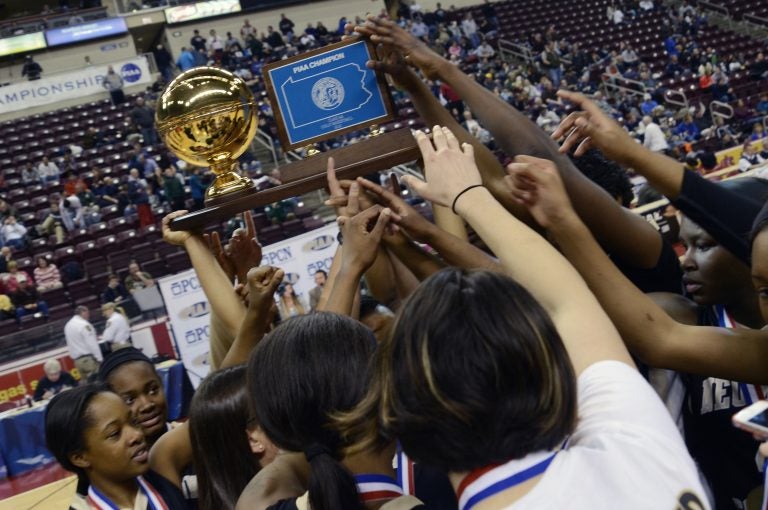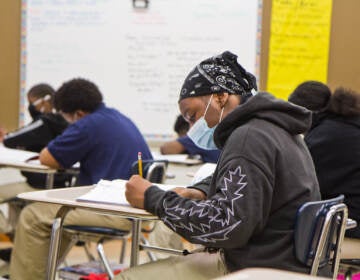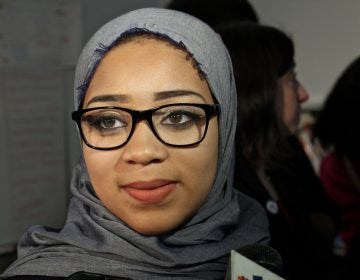Pa. school districts decry what they see as growing disparity in state sports competitions
The districts claim sporting events have become less competitive since charter and private schools joined traditional public schools in state playoffs.

Neumann-Goretti players reach for the championship trophy at the end of a PIAA high school Class AA Girls championship basketball game against Seton LaSalle in Hershey, Pa. on Friday, March 20, 2015. Nuemann-Goretti won 79 - 34. (AP Photo/Ralph Wilson)
More than 150 public school districts in Pennsylvania are meeting in State College Tuesday to come up with solutions to what they see as a growing disparity in middle and high school sports competitions.
The districts claim sporting events have become less competitive since charter and private schools joined traditional public schools in state playoffs.
They point to state tournaments, where private and charter schools have been winning more often than their traditional public school counterparts. And they blame the Pennsylvania Interscholastic Athletic Association or PIAA, which governs middle to high school sports, which failed to include them in a public hearing last week where the organization outlined ideas to address the situation. Catholic and charter school representatives were included.
Now, the public schools will have their opportunity to air their grievances at what they’re calling the Playoff Equity Summit. PIAA representatives were not invited to the meeting.
Since 2008, private and charter schools have won the state football championship half the time, with an even better record for girls’ and boys’ basketball championships. These lopsided wins have led some district administrators and coaches to claim that private and charter schools have an unfair advantage since they can recruit from anywhere, while public schools can only draw from kids living in their catchment areas.
“I just want to be be clear: There’s a variety of different sports that PIAA oversees and the only complaints that we’re hearing about is football and boys’ and girls’ basketball,” said state Rep. Gene DiGirolamo, chair of the PIAA legislative oversight committee.
Superintendent John Sarandrea of New Castle Area School District in Lawrence County in Western Pennsylvania, says during Tuesday’s meeting, the districts plan to discuss their ideas for changing the landscape for traditional public school students.
“It’s always good to have meaningful, respectful discussion,” Sarandrea said. “It’s never a good sign when somebody says, ‘This is what we’re going to do, and you can either follow it or you can pick up your ball go home.’ That’s what we feel like we’re being told right now.”
While PIAA has instituted stricter rules for transfer students among other new provisions, traditional public schools would like the association to hold separate playoff tournaments for their students — which would require legislative action.
PIAA says that is a nonstarter. Officials cite the 1972 Pennsylvania law that ensures private and charter schools are allowed to participate in statewide competitions.
Act 219 simply states, “Private schools shall be permitted, if otherwise qualified, to be members of the Pennsylvania Interscholastic Athletic Association.”
“If you’re thinking of moving the privates out, then you’re looking at them differently than you’re looking at the publics,” said Jennifer Grassel, PIAA’s assistant executive director. “The law says you have to look at everybody the same, so when you separate somebody out, you’re not looking at them the same.”
Sarandrea says school districts wanted to have discussions about “a whole plethora of possibilities,” but didn’t believe PIAA was open to all possibilities.
“We don’t feel like this is the solution. We don’t feel like it goes far enough,” he said. “Quite frankly, if the superintendents hadn’t gotten involved a few months ago and started to, if you will, scream a little bit, I don’t believe PIAA was poised and ready to do anything.”
PIAA formed a competition committee last March to look at issues of equity and transfer rules.
“I think we ought to give these changes a chance to work and see if they do work, before we go into doing something more drastic,” said DiGirolamo.
The Bucks County Republican said the only way to find out if the new rules are enough is to let them go into effect and see if they work or not.
“These are young men and women who are like 15, 16 and 17 years old. We’re all in this to make sure that they have athletic opportunities out there, and that it’s fair and balanced,” DiGirolamo said.
Keith Yarger, superintendent of the Juniata County School District in Western Pennsylvania, says the new rules help, but don’t resolve the issue.
“If we are making these changes as far as trying to make things as equitable as possible, then why not make the changes to make things even more equitable and do it now rather than kicking the can down the road?” he said.
Some districts have threatened to leave PIAA if substantial changes aren’t made.
Yarger isn’t among them.
“I do not think that starting any kind of new organization outside PIAA is anything that we really want to look into. I think PIAA is a wonderful organization. I just think having things fair and equitable is the way to go,” he said.
New Castle’s superintendent Sarandrea says the “nuclear option” of leaving PIAA may be required.
“You have 30 percent of the school districts in Pennsylvania attending,” he said. “If large portions of schools continue to feel like their voices are not being heard and their concerns are not being addressed, then at some point in time people are going to realize that there really isn’t any choice and have to do something a little bit more drastic.”
Yarger, Juniata’s superintendent, doesn’t know if there is one clear-cut solution.
“Everyone needs to sit down and discuss and have open honest communication and try to come up with a way to make things equitable for all students across the state so that everyone has an equal playing field,” Yarger said.
Another PIAA proposal is competitive classification, which would take effect in two years. Currently, schools are classified based on enrollment, but a competitive classification would involve a points system based on size, track record, and the number of transfer student athletes.
Neighboring states New Jersey and Maryland have separate state tournaments for traditional public and non-public schools.
The public schools hope another hearing will be scheduled when Pennsylvania’s General Assembly is back in session in September.
WHYY is your source for fact-based, in-depth journalism and information. As a nonprofit organization, we rely on financial support from readers like you. Please give today.





